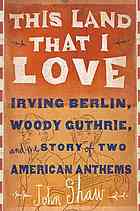
This Land that I Love
Irving Berlin, Woody Guthrie, and the Story of Two American Anthems
کتاب های مرتبط
- اطلاعات
- نقد و بررسی
- دیدگاه کاربران
نقد و بررسی

August 26, 2013
Shaw’s meandering book simply retells the well-known story that Woody Guthrie wrote his epic “This Land Is Your Land” as a rejoinder to Irving Berlin’s “God Bless America.” Side by side, he traces the similarities between Berlin’s and Guthrie’s upbringings, comparing some of the forces that may have led each writer to what would eventually become his most recognizable song. Berlin was a Russian émigré who rose from homelessness to wealth, and Guthrie fled the Oklahoma Dust Bowl and a broken family to fame and something like fortune in New York City. When they were young, both men “busked for money, making up parodies of popular songs, and were known for their quick wit and eagerness to entertain.” Berlin wrote “God Bless America” for Kate Smith so that she could have a “special song for her annual Armistice Day broadcast.” Guthrie wrote the first draft of his anthem in February 1940 after spending days frozen on the streets and not feeling as if he lived in “sweet America.” He cast his lyrics in a tune modified from the Carter Family’s “When the World’s on Fire,” in his early sarcastic response to Berlin’s song. Along the way, Shaw digresses unprofitably into discussions of other anthems that have shaped America: “My Country ‘Tis of Thee,” “Lift Every Voice and Sing,” and “The Star-Spangled Banner.” Shaw’s uninspiring book loses its thread in its unfocused structure and reveals no important new insights about the songs, the singers, or their relation to each other. Agent: Paul Bresnick, Paul Bresnick Literary.

November 1, 2013
The juxtaposition of two of America's most enduring national anthems. The beginning of this provocative history of Woody Guthrie's persistent folk song and elementary school staple "This Land is Your Land" and Irving Berlin's overly sentimental "God Bless America" is a visceral scene. Writes music and theater critic Shaw, "Woody Guthrie was worried he might freeze to death. Twenty-seven years old and almost completely unknown, he was hitchhiking to New York and had been stuck outside Harrisburg, Pennsylvania, standing for hours in a snowstorm, waiting for someone, anyone, to pick him up." It's also a supposition, one of many that the narrative is built around: "Some people say that it was when he was freezing on the side of the road that he started thinking about a rebuttal [to "God Bless America"], a song that would give vent to his leftist politics." What people, exactly? From there, this is a by-the-books (lots of books, with little original research) retelling of a story most folk-music fans know already. Shaw tries hard to weave tenuous threads between Berlin, the wealthy, internationally famous songwriter, and Guthrie, the singer/songwriter with a chip on his shoulder and a bunch of Carter Family melodies in his head. Berlin's story doesn't resonate well here; even 40-something years gone, Guthrie casts a very long shadow. Shaw does unearth an interesting alternative version of "This Land is Your Land" from the Woody Guthrie Archives. Written in the 1950s, it loses much of its politics, substituting mystical imagery about fertility and joy. For readers who want to delve deeply into one of these two specific songs, this book is a pleasant, harmless diversion. More casual readers would be better served by Joe Klein's 1980 biography or, better yet, Woody's own 1943 story, Bound For Glory. Shaw tries to pull off the same trick here as Alan Light did with Leonard Cohen's "Hallelujah" in The Holy or the Broken (2012), but there's too little weight here to justify the act.
COPYRIGHT(2013) Kirkus Reviews, ALL RIGHTS RESERVED.

November 1, 2013
In telling the stories of those unofficial U.S. national anthems, God Bless America and This Land Is Your Land, Shaw tells those of most of their predecessors, too, including the official one, The Star-Spangled Banner. So doing, he recaps much American musical-entertainment history and intertwines the careers of his main subjects' creators, Irving Berlin and Woody Guthrie. Berlin, though responding to a request for a march, crafted a song he preferred be delivered as a prayer-like ballad (he got his client, Kate Smith, to first sing it that way, too, though she reprised it martially). Guthrie never really finished his song, tinkering with the words until Huntington's disease disabled him (others, including Pete Seeger, further messed with them). Coursing through the account is a concern for antiblack racism, always the greatest challenge to the sentiments of U.S. national anthems. Shaw writes unusually accessibly (e.g., using solf'ge when discussing musical phrases) but sometimes sloppily (e.g., notes of indeterminate pitch huh?). Finally, the bibliography is more popular than academic, and the recommended listening essay is full of fascination.(Reprinted with permission of Booklist, copyright 2013, American Library Association.)

























دیدگاه کاربران